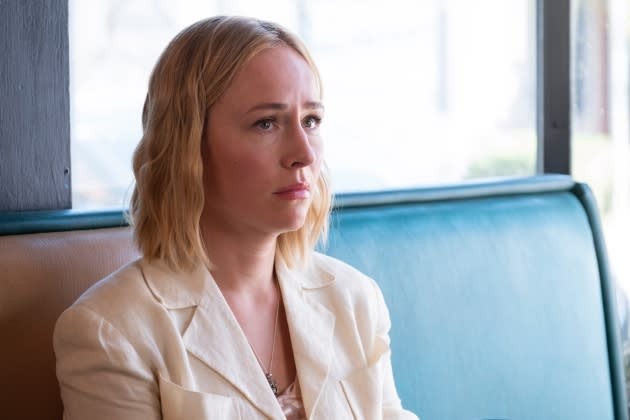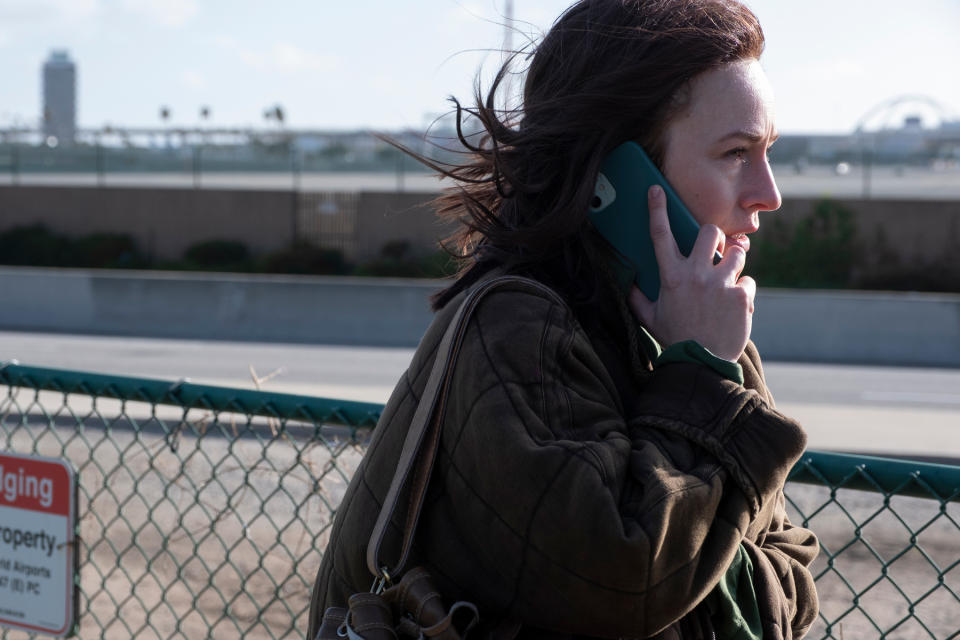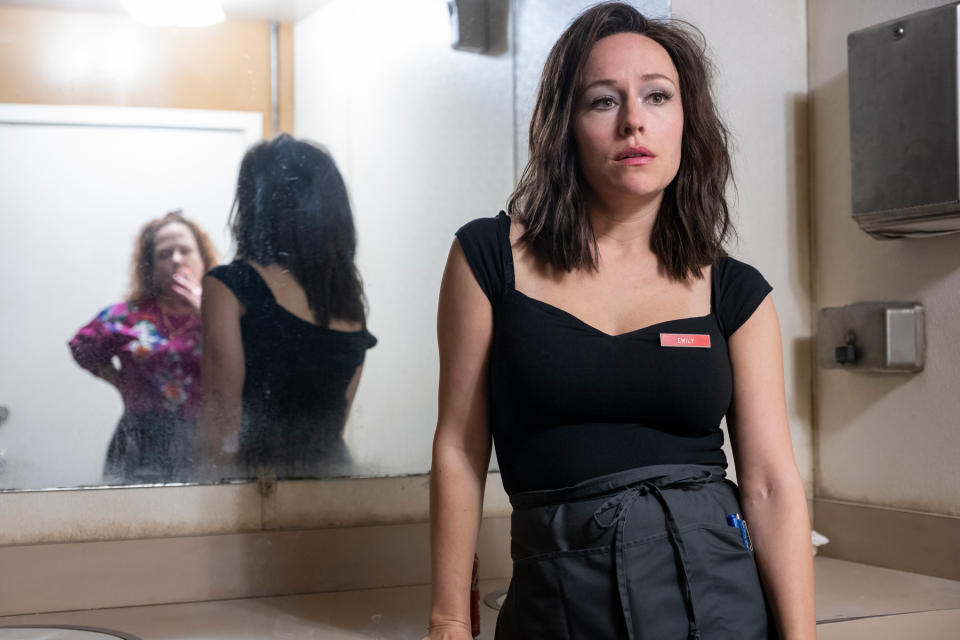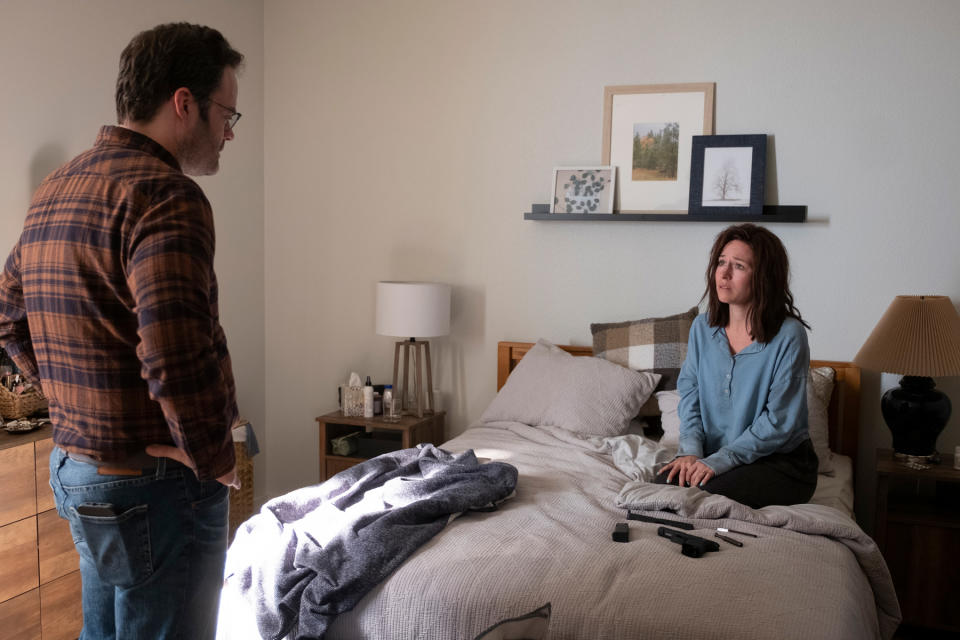Sarah Goldberg’s ‘Barry’ Exit Interview: Sally’s Finale Secrets and More

Week after week, in frantic monologue after frantic monologue, Sarah Goldberg delivered one of the greatest performances on TV in recent memory as Barry‘s self-obsessed actress Sally Reed, whose intensity occasionally unnerved even Bill Hader’s titular hitman character. She scored an Emmy nomination for her performance in Season One — for this season, where she disguises herself as a brunette waitress with a Southern accent, becomes one of the worst on-screen mothers ever, and melts down into hallucinations, she deserves a win. “I don’t know if in my lifetime, I’ll find another part like Sally,” says Goldberg, who will next appear in the self-penned IFC comedy Sisters. In the wake of Barry‘s season finale, she went deep on the show’s ending and looked back at some earlier highlights.
You gave the showrunners a note early on that you wanted Sally to go as dark as possible. How much do you think that affected the actual direction of the show?
I think it affected things, in that it looks like I got my way! But also, Bill [Hader] was in alignment. And so was Alec [Berg]. We all felt that the tone of the show is very elastic and could hold drama and comedy. I always felt like there was a risk with Sally because I was the only female series regular. We have this whole group of men who are morally bankrupt on the show, and there was a risk that there would be a push to have her be the more moral barometer of the show, or make her suddenly be nice and maternal and all of these female tropes. My main concern was just keeping her protected in the sense that I wanted her to be as ugly as the men. It felt like anything else would be a little bit misogynistic. To assume that she’s going to somehow be good, just by virtue of being female? And, Alec and Bill were always on board for that. The three of us had to, at times, fight off the voices saying, ‘why can’t she be more likable?’ But we held down the fort for Sally. I don’t think we ever teetered into likability.
More from Rolling Stone
I really enjoyed the finale, and I’m still kind of processing it. We leave Sally in the car driving away after the play. Where, in your mind, is she emotionally?
I wondered whether there was going to be some big dramatic end for Sally, whether she dies, or she kills Barry, or she gets in a sudden car accident. But it was just this simple, simple ending. And on the page, you know, that’s it. I thought, “huh,” you know. And then when we shot it, it was so lovely. There was such a quiet on set. And I think Sally has been through so many highs and lows over the four seasons, mostly lows — she went to rock bottom, and then she found the rock underneath rock bottom. And I feel like, here’s this lovely little piece of contentment. Here was this girl who had these big dreams of stardom and went to L.A. to invent herself. We now know that it couldn’t have gone worse. She had these huge ambitions and, and what’s lovely is, you know, she’s sitting there in the car with this bouquet of supermarket flowers next to her. And it could be an Oscar. What it represents to her is a tiny, micro version of that recognition, the contentment that she had been searching for on a massive scale. She’s doing a high school production of Our Town. And she’s fulfilled by that. And it’s kind of beautiful.
And equally, we leave her with a little bit of the old ambition and narcissism that we come to know when her son is saying, “I love you,” and instead of saying “I love you, too,” she says, “‘It was good, wasn’t it? Was it okay?” She still needs that external validation. So when we leave her, she’s still Sally. It’s not like she’s completely evolved, but she’s in a much better place than when we started. I just thought it was beautiful, poetic, and very, very simple. I was pleased with it.
You had to, in a single scene, establish a dynamic with a new, older actor [Jaeden Martell] as Sally’s son, John, which couldn’t have been easy.
That was my last day filming, so there were a lot of things going on. Luckily, I had met him in the makeup trailer a couple of days before to at least say hello. I always try to establish a little bond with an actor before shooting something big, and on Barry we usually rehearse everything, but we didn’t get a chance to rehearse that scene. But he was so present, and he had done a lot of work on his character. It was very special and easy. He brought everything it needed. The day on set was strange because we were in Los Angeles, but there was a snow machine, so it had this dream-like atmosphere. I was already trying not to bring unnecessary emotions to the scene. I couldn’t play the whole scene in a state of wistful nostalgia.
What do you think we’re supposed to take away from the revelation that there was this hit movie about Barry that was filled with lies, making Barry a hero and Cousineau the villain?
I’ve only just seen the finale myself. I haven’t quite found the words to articulate how I feel. But I’m going to try for you. I love how sick and twisted and dark it is. There’s a commentary there on Hollywood, on morality, on truth and lies, on the version of things we present in the media versus the reality, and on the world we live in, where there’s so much on the internet that is false. I felt like it was a very dark commentary on humanity and what we choose to believe. And, you know, you could say the whole of Barry was a metaphor for America. And I love the ambiguity of Jaeden as John. He plays it so beautifully watching that, where he knows this isn’t true. There’s the scene within the film where Barry’s rescuing us from the shootout. But obviously, John would remember that’s not how that went. Plus, Sally told him that his father is a murderer. And yet it’s not like he says to his friend, “You know what? This isn’t what happened.” There’s a small sense of relief in him that this is the version of things that is out in the world. And I think he’s grown into a decent person somehow, despite his DNA on both sides, and yet he also comes from two liars and there’s a lie being told. And I was really excited to see what Louisa Krause did with fake Sally, and she was so good. I felt like it also was fun to return to some comedy. It was really funny, but with that dark Barry tone of, “We’re laughing, but at what cost?”

The really dark joke is that the person who ends up punished the most is Cousineau. Even Barry got a quick death, but Cousineau took all the blame and is rotting in prison. And I was trying to think about what the show was saying with that.
I know, and I haven’t even gotten to the bottom of it. So I can’t give you a concrete thing. But there’s something in there around, “There’s no justice.” There’s something really bleak and cynical about it, but feels appropriate for our show.
Did you use music or anything else specific to help you find Sally over the course of the show?
No, music historically has been a part of my process, but not for Sally. I can’t articulate my process for her in words. She lived in some dark space inside me, and she had to come out. When I first read her on the page, I knew her. It felt like I had met her at a bar in L.A. I had immense empathy and compassion for her. I knew her rhythms, especially in the first couple of seasons when the text had more verbosity and comedic tone. Toward the end, things got so dark, and it became about finding her rhythm. Sally speaks quickly and has a myopic view of the world, focused only on what she wants. So I suppose the challenge of her is that she doesn’t listen. But as an actor, you need to listen within the scene.
Not corpsing [breaking into laughter] was also a challenge, especially when D’Arcy Carden improvised something and made me laugh so hard. I would feel terrible, because it would ruin takes. It may sound lazy, but toward the end, I didn’t do a lot of preparation because I knew who Sally was. I just had to leave myself alone enough at work and let go of my own ego to let her out. I mean, certain scenes, like the monologue in Season Two, did require a significant amount of preparation. I treated them like rehearsing for a one-woman show because I knew we would get it in one take and didn’t want to waste time searching for it.
There’s been a lot of discussion about the scene in Episode Six of this season where it looks like there’s a home invader and it seems like a truck is attacking Sally and Barry’s house. I think it made a lot of smart people feel dumb, because it was a little unclear. How were you playing that?
[Laughs] Well, tell me what you thought first.
I ultimately went on the side of pure hallucination, that none of it was real, that she was wrecking the house herself in almost a fugue state. That’s my best guess.
That’s how I viewed it as well. But I think that the ambiguity is great. And I think that there doesn’t have to be a right answer. And I think the audience can take what they want from it. I mean, there’s a world where Bevel is showing up and taunting her in some way, but I think she, at that point, has completely lost her mind. And she’s very drunk and not sleeping and very afraid. We shot the wheel crashing through the wall and there was also a shot when you pan back quickly, and as she’s exiting the bedroom, the wall is smooth. Now I don’t know if they kept that in the final edit, because that’s concrete evidence that it wasn’t real. [Editor’s Note: That shot wasn’t in the final cut.]
But even the fact they shot that is a tip-off.
I love the idea that she trashed her own place in a fever dream. There was a scene we cut where her colleague from the diner comes at the end and Sally forgets to speak in her Southern accent. And then halfway through speaking, slowly brings it back realizing she’s dropped it. And Sally says Bevel did this, and her colleague says, “Oh, Bevel left town a couple days ago.” They cut that because it played as comedy in a way that didn’t match the rest of the show at that point, but I think it was also to leave it intentionally ambiguous.
I did laugh out loud at the first reveal of her in disguise in the diner. Because she’s doing so much, as usual.
[Laughs] Too much! More than she needs to do.

She clearly spent way too much time perfecting the look.
The hair, the eyeshadow, the lashes! Even the clothes. Those are clothes we’ve never seen Sally in.
There’s a strong implication that playing this role of the trashy waitress is the one part of her exile that she’s deeply enjoying.
For sure. I think it’s all she has left. And I think I really wanted to make that a performance. She’s like, if I’m going to live in the middle of nowhere in this depressing life with this man who’s lost the plot, and this child I didn’t want, then every single day I’m gonna give my best Meryl Streep and I’m gonna put on the works and give the best performance of my career. It’s the only piece of joy she has. And you could argue it’s not even bringing her that much joy, but it’s a little piece of her old self.
It’s unusual to get a chance to go that far in the direction of a really bad mother, particularly in that scene where she gives John vodka. What were your thoughts on that?
I’m thrilled that we went all the way with that. I was worried the vodka scene would get cut, but it felt important to me. Sally is not well, and by this stage, she’s the least well we’ve seen her. She didn’t want to be a mother. She’s stuck with a child she didn’t want, who serves as a constant reminder of a series of bad decisions. Making her a terrible mother seemed like the obvious choice. I tried to imagine it the other way around, with Sally suddenly loving to cook, being nurturing, and reading her child a story, but I couldn’t picture it. I can’t imagine her giving birth either. I feel like she would have checked out, taken all the drugs and booze, and said, “Wake me up when it’s over.” It was never one of her life ambitions to become a mother. The puzzle piece from Episode One, seeing what her mother was like, is quite helpful. She just took it up a notch.
Bill said there was talk last season of having Sally decide that with her career falling apart, she wanted to have a baby with Barry. But that was quickly abandoned, right?
That was a pitch, and it just felt all wrong to me. I couldn’t see that for her at all. Sometimes when TV shows don’t know what to do with a female character, they get her pregnant, and it drives me crazy because “woman has baby” is not a storyline. It can be a plot point, but it’s not a storyline. They said they needed something that bound Barry and Sally together forever, and I suggested that maybe they commit a crime together since the show is about people killing people. It would be a pact made in blood, which aligned with the initial pitch Bill had for me about Barry and Sally having a Macbeth/Lady Macbeth dynamic. We hinted at that in Season One, so going down the murder path felt more tonally right for the show. That’s the beauty of the show and the collaboration. All these ideas are discussed, and nobody gets defensive. It’s the kind of show where you can throw out as many ideas as you want. That’s something I took away from this experience and want to bring to my work – the freedom to have multiple ideas, knowing that the egolessness of exploring them is great. I wasn’t offended by the pitch, just surprised. Once we all said it out loud, we realized it wasn’t the right direction. But then I liked the way they did eventually throw in a child for the two of them. And we did it in this absolutely tragic and bleak way and not, “Sally has an epiphany that the answer to life is motherhood.” I just don’t know how I would have sold that.

Tell me about shooting Sally’s elevator meltdown last season, especially with the pressure of knowing it would be shown again and again on the show.
We shot the scene in an elevator set they built, which was nice. The set was a bit larger than an average elevator for the camera’s sake, giving us some room to play. We had a lot of coverage planned for that day, and I thought we would be there all day. We cut a lot of text and jokes, halved it, and did a wide shot, and Bill said, “This plays in a oner.” I was terrified, because you really want to give the editor something to work with. So suddenly, the pressure was on a little bit. I don’t remember how many takes we did, maybe around four or five. Something just snapped, and I let out all the rage I have toward the patriarchy in that one scene. D’Arcy had the technical job of making sure to get the phone in the right position and pivot at the end for the camera, which was challenging in a one-take situation. If that was messed up, we couldn’t use it.
It didn’t occur to me that she really was shooting it on the phone.
When there’s a small clip of it on YouTube, that’s what Darcy filmed. So she had to be DP in that scene as well, while acting. I live in England, so we use the word “cunt” all the time, but it was a privilege to get to do it on American television. [Laughs]
In the scene this season when she’s trying to become an acting teacher, and horrifies all the Gen-Z students with Cousineau’s methods, I was pretty much on Sally’s side. The methods do work.
I’m on Sally’s side. I mean, Sally takes everything too far, but her intentions are actually good in that scene. I think that the writers were trying to say there’s a commentary there generationally and we were able to stomach it versus what’s OK now. And I’m shocked at some of the things that we put up with when we were in theater school and didn’t think twice about because you assume that hierarchy and you accept being treated in that way. But I was personally also curious about the gender situation, which is what we might accept in an acting class from a fatherly male figure, versus a younger female up there teaching that way.
Bill’s talked about a horror film being next for him. And immediately people said, “Oh, I hope he casts Sarah.” But in your mind, is it too soon to work together again?
I think maybe we all need a break to shed these people, or else I might show up as Sally in a horror movie, which would be no use to Bill. You’d have to ask him, I guess. But I think that we were in this seven years from start to finish. And, I’m gonna miss everyone so much. And working with Stephen Root and Henry Winkler was one of the greatest privileges of my life. And Anthony Carrigan, who’s the nicest person on the planet, and I didn’t even get to do that many scenes with Steven and Anthony, sadly. I wish I could have done more. So I hope we all work together again, but maybe we all need to shed these morally bankrupt people first.
Best of Rolling Stone

 Yahoo Sports
Yahoo Sports 